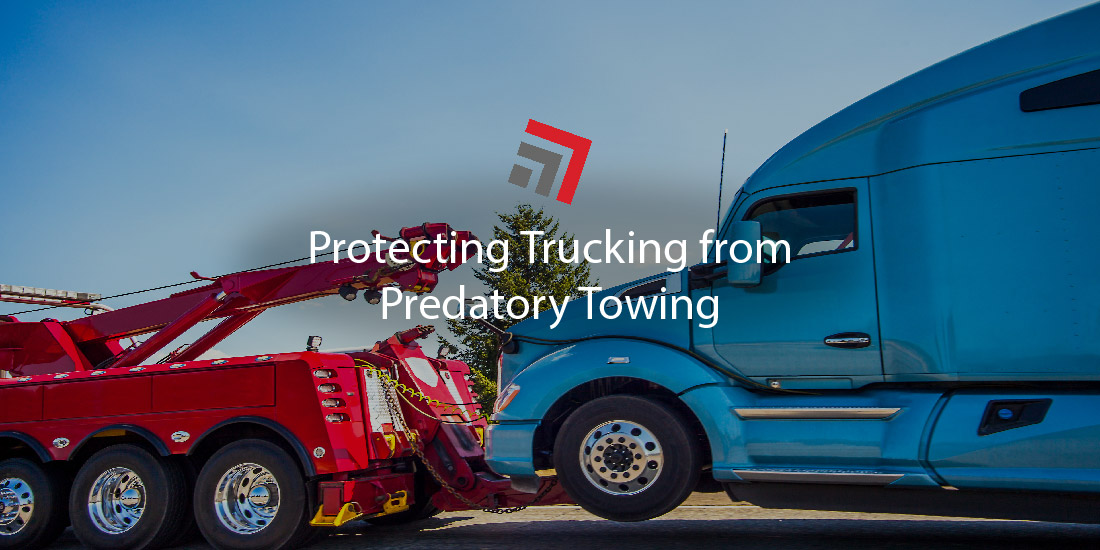It’s unfortunate that predatory towing is a reality. The towing industry as a whole is often overlooked for the helpful services it provides for safe and effective solutions for transporting vehicles. Whether it’s saving the day when your car breaks down or clearing the roads of hazards after accidents, towing is a service no one wants to ever use, but will no doubt be thankful for when they do have to.
That said, this blog is not about celebrating the towing industry. While our experts at Commerce Express Inc. assure you that we appreciate towing’s role in upholding the safety of our roadways, this blog is about predatory towing, its impacts on trucking, and how carriers (and their fleets) can prevent it.
Predatory towing
Predatory towing is the act of certain tow truck operators who prey on people’s vehicles without any reasonable discretion to do so. While anyone’s vehicle is at risk, let’s narrow our concern solely to trucking.
That said, incidents include when an operator egregiously overcharges, illegally seizes, damages by use of improper equipment, or withholds release of a truck or cargo.
The American Transportation Research Institute (ATRI) declares that predatory towing has a persistent and negative impact on the trucking industry.
Determined to better understand the problem, ATRI has gone to straight to trucking for answers. The research institute created a 14-quesiton survey asking fleets to share their experiences with predatory towing and detail which types of incidents occur most frequently.
Fleets are also encouraged to provide feedback on what fees or delays they consider predatory and which states they have run into predatory tows.
The goal of this survey is to put some robust analysis into an issue that otherwise had none. While predatory towing has been a well-known problem for years, the understanding of how, when, and where it happens has been bleak in comparison.
A compilation of feedback from motor carriers and drivers can help pave the way for outlining solutions to further crack down on this malfeasance.
Tips for carriers and drivers to avoid predatory towing
While the survey may allow for better visibility behind predatory towing and how to mitigate its impacts on trucking, fleets must also keep their guard up and protect their drivers, assets, and cargo. The following are some tips for protection against predatory towing.
Be familiar with state and local parking and towing laws
This is especially important for truckers, the soldiers on the ground. Parking laws can shift on the whims of state and local ordinances. Truck drivers, as well their carriers, should educate themselves on changing laws throughout their journey. This can help avoid the risks of illegal parking and unnecessary fines.
Towing laws can also vary between states and jurisdictions. This includes different predatory towing laws as well. A good resource to use is a certain state’s DOT website for specifics.
And, remember, drivers always have their right to access their vehicle in a towing situation.
If a vehicle is disabled, drivers should call their fleets
In the case of a rig being disabled, drivers should drop everything and call their carrier immediately to request a tow. With the best interest in mind, the carrier will call for a reputable tower and provide the company details to their drivers.
However, if the truck is impeding traffic, the local police will dispatch a contracted tower instead to expediate the process. Unfortunately, predatory towers are opportunistic vultures and will sometimes listen to police dispatch. They then will show up and pretend they were dispatched for the job. Drivers need to emphasize the importance of verifying identification.
Drivers should get information during a tow
If present when a towing company is removing their truck, drivers should ask for a business card and where their truck is going.
Furthermore, they should take a photo of the tow truck’s license plate. If the tower is predatory, this can help police track down them down and return the vehicle to its fleet.
Final Thoughts
More sage advice includes don’t sign anything, contact authorities (if a predatory tow is suspected), and review all charges and dispute if needed.
ATRI is seeking out input from motor carriers and drivers for its “Quantifying Industry Impacts from Predatory Towing” survey. If you are in one of these positions, we encourage you to fill out the survey.
Contact one of our team members if you have any questions regarding this topic or any others in domestic logistics.
This is an everchanging industry. Stay current on rail and trucking developments with our weekly Road Map Newsletter.



Recent Comments